It is completely possible to get a total body workout from your own home. No weights? No gym? No problem! We’ve put together seven moves for a full-body circuit, from head to toe, all without needing a single dumbbell! We’re talking about a routine that will help sculpt your entire body all from the comfort of ease of your own living room or bedroom.
Workout routines designed for specific muscles individually can create muscle imbalances, which can lead to poor posture and injuries. On the other hand, full-body workouts tend to incorporate dynamic exercises that use many muscle groups simultaneously and mimic functional movements.
7 Exercise to a Toned Body
Pushups (20 x):
A basic push-up does not require any equipment other than your own body weight and your arms. It can be done anywhere there is a firm surface. And it works the chest, the shoulders, abs, and the triceps. Modifications can be made for different fitness levels. If a traditional push-up is too hard, try resting your knees on the ground while you do a push-up.
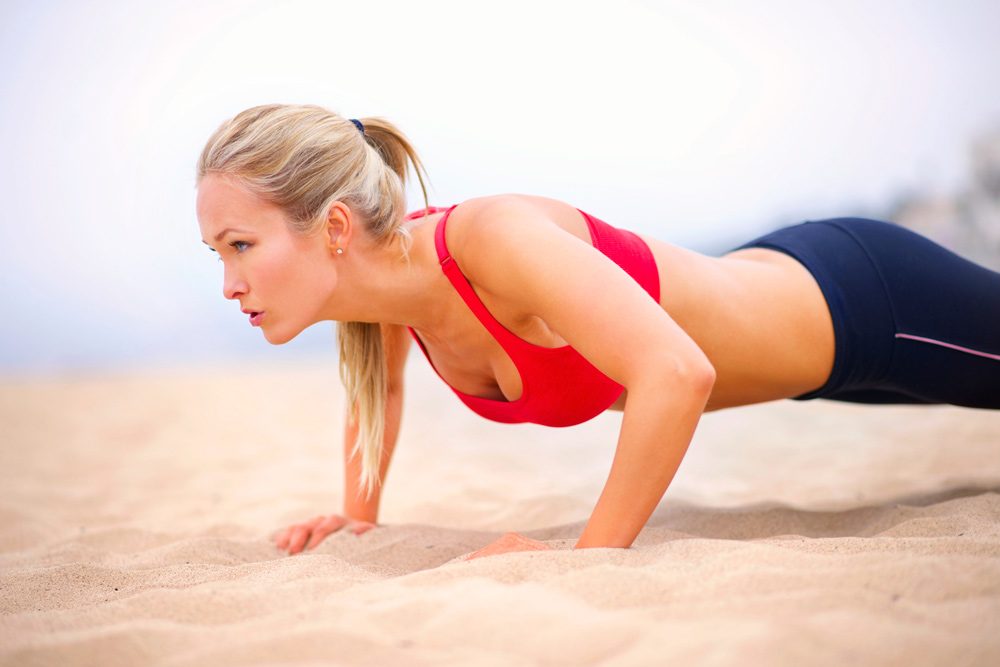
To do the exercise:
- Assume a prone position on the floor or other surface that’s able to support your body weight. Keep your feet together. Place your hands under your shoulders with your palms on the ground.
- Curl your toes upward (towards your head) so that the balls of your feet touch the ground. Raise yourself using your arms. At this point, your weight should be supported by your hands and the balls of your feet. This position is called “plank,” which is used for other various exercises. This is the beginning and the end position of a single push-up.
- Lower your torso to the ground until your elbows form a 90 degree angle. Keep your head facing forward. Try to have the tip of your nose pointed directly to the front as you’re going down.
- Draw a breath as you lower yourself.
- Raise yourself by attempting to push the ground away from you. Breathe out as you push. The power for that push will inevitably come from your shoulders and chest. The triceps are also contracted but the primary exercise for the triceps isn’t the push-up. Continue the push until your arms are just about straight.
- Stretch the chest and shoulder muscles during your cool down cycle.
Donkey Kicks (10 x each side)
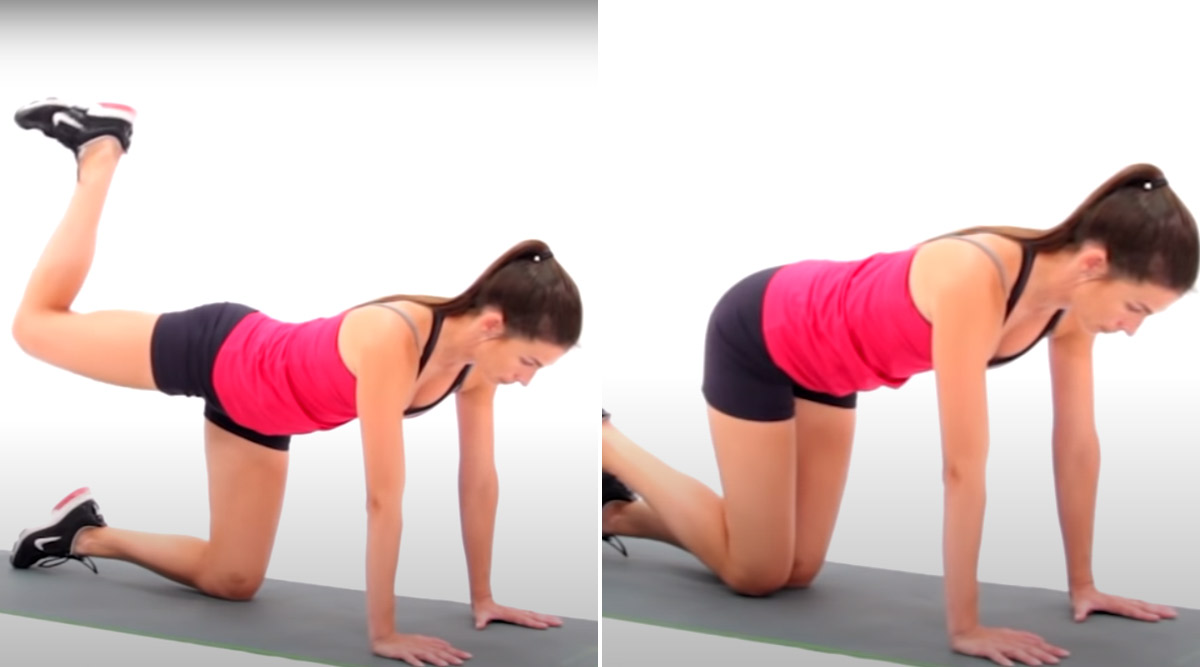
One of the best exercises to tone the backs of your thighs is the Donkey Kick. This exercise works the butt, abs, and arms.
- Get down on all fours with knees directly under hips and hands positioned under shoulders, keeping the spine straight. Keeping a 90* angle between your hips and the floor, lift one knee off the ground, to the side (as if you were going to do a fire hydrant move) and kick straight back keeping the kicking leg parallel with the spine, the foot flexed and the ankle toward the ceiling, toes pointed out.
- As always, perform the kick out and kick in on a 10-count each for 90-120 seconds and switch sides.
Forearm to Hand Plank (10 x)
- Start in high plank. Bend one arm to bring the elbow and forearm to the floor.
- Bring the other arm down so you are in a forearm plank.
- Push back up to the start position, placing each hand where your elbows were.
- Repeat this movement, alternating which side you lower first with each rep.
Hamstring Slides (10 x)
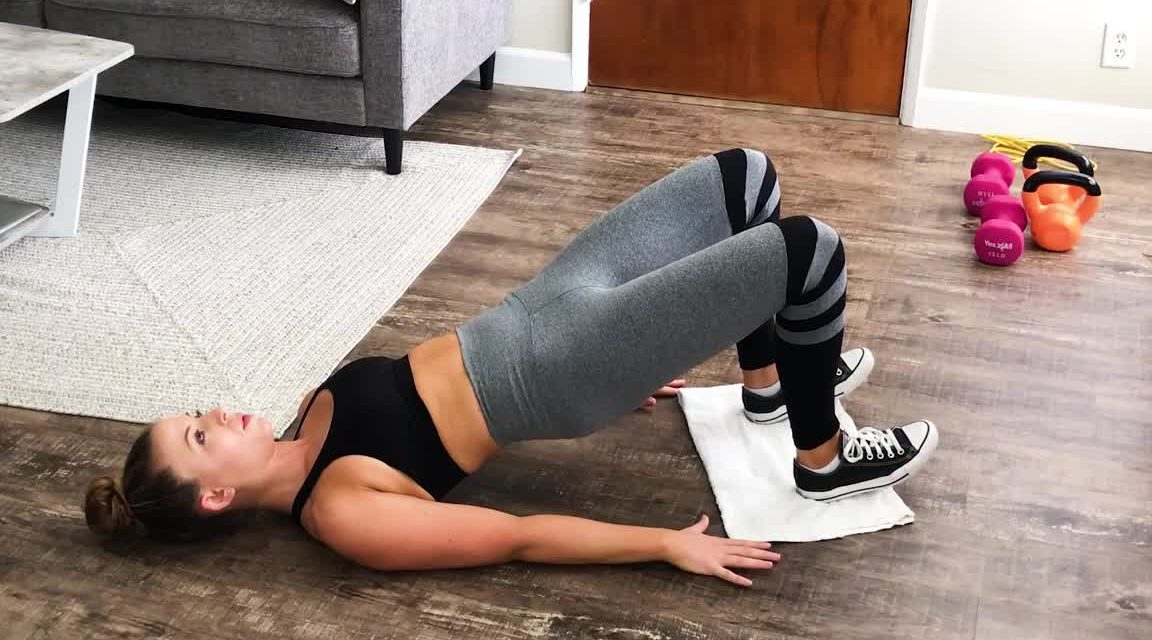
This exercise is great for building muscle along the backs of your legs!
- For this movement a wooden floor or similar is needed. Lay on your back with your legs extended. Place a gym towel or a light weight underneath your heel. This will be your starting position.
- Begin the movement by flexing the knee, keeping your other leg straight.
- Continue bringing the heel closer to you, sliding it on the floor.
- At full knee flexion, reverse the movement to return to the starting position.
- Remember to keep your core engaged!
SL Squats (10 x each side)
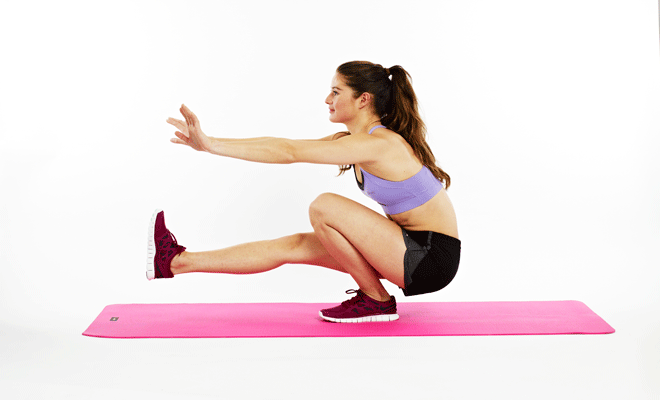
Doing the single-leg squat, or any squat for that matter is an effective way to tone the legs and glutes, strengthen the core muscles and increase flexibility.
- Stand on one leg with your foot pointing straight ahead and the knee of the other leg slightly bent. You can have your arms extended for balance or kept at your sides. Roll your shoulder blades back and keep your back straight. Keep your weight centered over the ball of your foot, your upper body erect, and your head facing forward.
- Raise the non-supporting foot from the floor slightly.
- Lower to a squat position, keeping the knee of the supporting leg centered over the ball of the foot. Start with shallow squats and work your way closer to the ground.
- Repeat for 10 squats on each leg. Aim for three sets.
Modification:
- You can modify the single-leg squat in a couple of ways to make it easier. First, do it against a wall with an exercise ball between your back and the wall. This will allow you to have a stability aid while you perfect the squat.
- Another easier variation is the one-leg box squat. Place a box or low chair behind you. Perform the one-leg squat until your buttocks touch the box, then push back up with your supporting leg.
Lying Leg Raises (20 x)
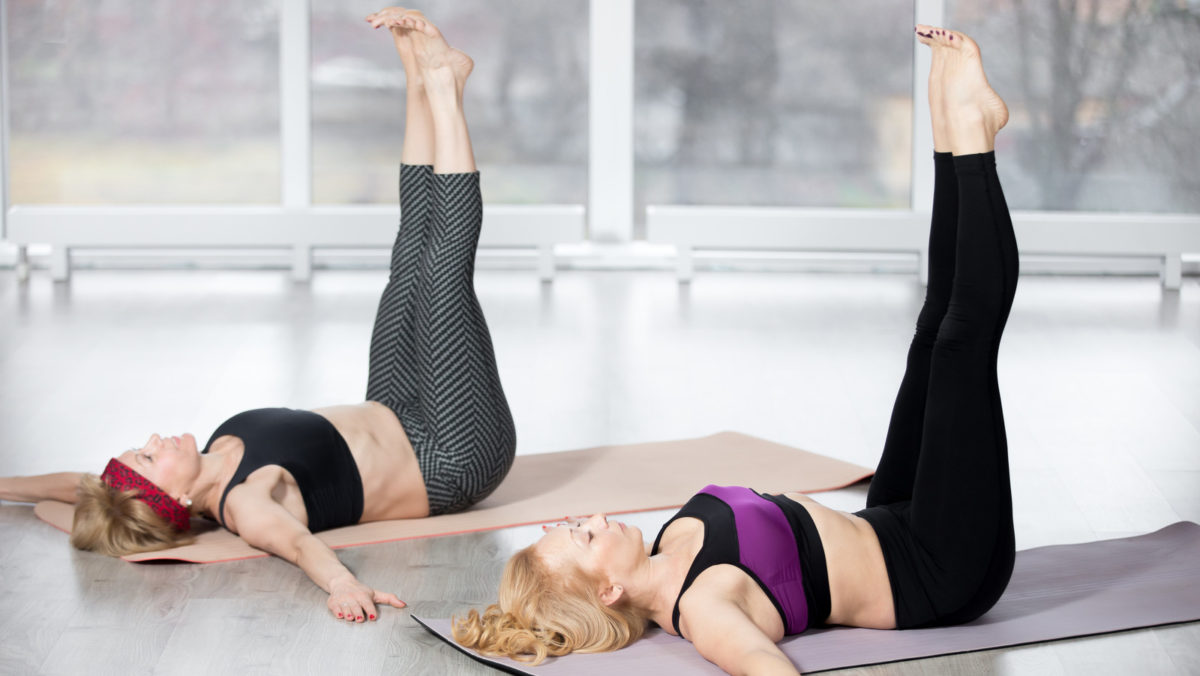
Lying leg raises are touted as a killer abs exercise—because they are. But your hip flexors actually reap some major benefits of this move.
- Lie on a mat on the floor, face-up, legs extended. Place your hands underneath your lower back and glutes so your pelvis is supported.
- Begin to raise your legs toward the ceiling, pressing your thighs together and keeping the legs straight.
- Lift until your hips are fully flexed and you can’t go any higher with straight legs, then lower back down and repeat.
Side Plank Leg Lifts (10 x each side)
A side-plank leg lift targets your shoulders, waist, abs, back, outer thighs, and glutes.
- Place your right elbow on the ground. Extend both legs out so that your body is in one straight line and you’re balancing on the outside edge of your right foot.
- Flex both feet if you can and either rest your top hand on your upper hip or extend it in the air. Keeping your spine lengthened and your abs engaged, lift your left leg up just higher than your top hip. Then slowly lower it back to your bottom leg.
- Do 10 reps on each side.
Don’t forget to Warm-up & cool-down, before and after the workout.
Disclaimer
The Content is not intended to be a substitute for professional medical advice, diagnosis, or treatment. Always seek the advice of your physician or other qualified health provider with any questions you may have regarding a medical condition.